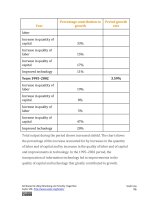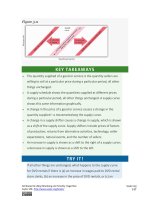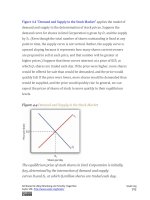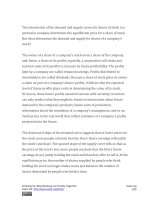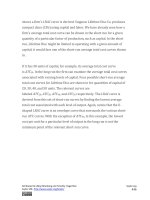Authors libby rittenberg 879
Bạn đang xem bản rút gọn của tài liệu. Xem và tải ngay bản đầy đủ của tài liệu tại đây (474.72 KB, 1 trang )
[3] W. Mark Crain and Thomas D. Hopkins, “The Impact of Regulatory Costs on
Small Firms,” Report for the Office of Advocacy, U.S. Small Business
Administration, Washington, D.C., RFP No. SBAHQ-00-R-0027, October 2001,
p. 1.
[4] W. Kip Viscusi, “Safety at Any Price?” Regulation, Fall 2002: 54–63.
16.4 Review and Practice
Summary
This chapter has shown that government intervention in markets takes the
form of antitrust action to prevent the abuse of market power and
regulations aimed at achieving socially desired objectives that are not or
cannot be provided by an unregulated market system.
We saw that antitrust policy has evolved from a view that big business was
bad business to an attempt to assess how the behavior of firms and the
structure of markets affect social welfare and the public interest. The rule
of reason rather than per se illegality guides most antitrust policy today,
but because there is considerable debate concerning the appropriate role
of government antitrust policy and regulation, application of the rule of
reason in specific cases is uneven. Prosecution and enforcement of the
nation’s antitrust laws has varied over time.
The rising role of a global economy in the last half of the twentieth century
reduced the degree of market power held by domestic firms. Policymakers
have reconsidered antitrust policy and what types of joint ventures and
cooperation among competing firms should be allowed. U.S. antitrust
policy has not been abandoned, but since the early 1980s it has been
Attributed to Libby Rittenberg and Timothy Tregarthen
Saylor URL: />
Saylor.org
879
